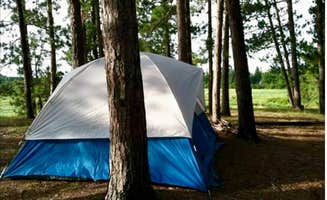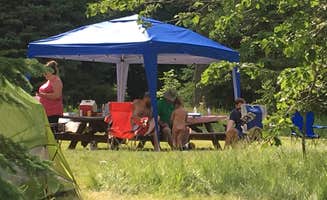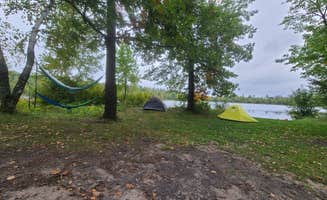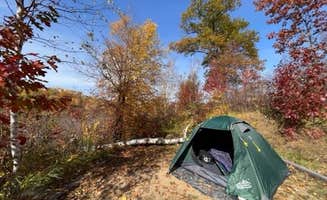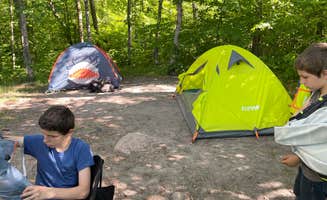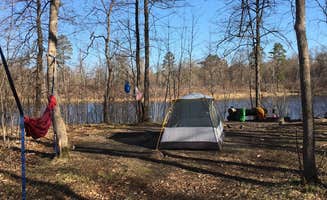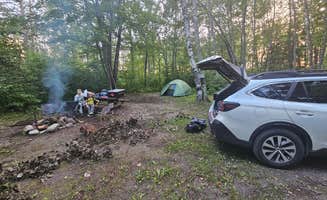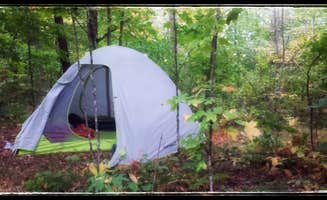Tent camping near Bemidji offers primitive to semi-developed sites throughout the Mississippi Headwaters region and surrounding forests. Most backcountry sites remain snow-covered until late April, with summer temperatures averaging 70-85°F during peak camping season. Water levels fluctuate significantly in spring, affecting river campsites and paddling conditions.
What to do
Wildlife observation at secluded lakes: Deer Park Lake Backcountry Campsite in Itasca State Park offers excellent wildlife viewing opportunities. "Woke up to trumpeter swans each day. Loved it. There is a little trail that brings you down to the lake to view the bird life," notes a camper who stayed multiple nights.
Paddle the connecting lakes: Gulch Lake in Paul Bunyan State Forest provides access to several interconnected waterways. "We were able to keep our kayaks and paddle boards at our site since we had lake access. It was a perfect camping trip," reports a camper at Lake Twentyone Watercraft Site. The unmotorized lake ensures peaceful conditions.
Hike the North Country Trail: Multiple tent camping areas connect to this long-distance trail. "The campground is connected to the North Country Trail which is super cool! There is a high bluff at the end of Nelson Lake along the NCT that has AMAZING views about a miles hike from the campground," shares one visitor who explored from Gulch Lake.
What campers like
Secluded waterfront sites: The walk-in campground loop at Norway Beach offers prime lakeside tent camping. "Campsites all along the lake shore, each site is huge and sheltered by giant pines, each has its own beach and water access, picnic tables, fire ring and more. Peace and quiet and amazing solitude!"
Winter camping options: Some areas remain accessible during snowy months. "Nice quiet spot out of the way. It was accessible even in winter. The snow was packed down enough to drive on even with a two wheel drive vehicle," notes a visitor at Camp Cassaway Dispersed.
Island camping experience: Star Island requires boat transport but rewards with unique camping. "There are several sites available along the south side of the island otherwise it is privately owned cabins all around the rest of the island. You do need a boat to get over to it." The island features an interior lake with additional camping spots and a swim beach.
What you should know
River camping conditions vary dramatically: Canoe-in sites along the Mississippi Headwaters can change significantly after storms or flooding. A campsite at Pine Point Canoe Campsite illustrates this challenge: "The heavy rains and floods at that time and since have also caused the main channel of the river to move further out in the reed bed, so the landing basically accesses a pretty shallow slough."
Permit requirements: Some sites require advance permits rather than on-site registration. For Mississippi High Banks, "you must get a county permit first, from the county parks department, and then they will give you the instructions for location, plus access through the gate."
Seasonal considerations: Most sites open May through September, with specific limitations: "Seasons typically run May through November, with some backcountry sites remaining open year-round for winter camping enthusiasts." Come prepared for dramatic temperature changes, especially in spring and fall.
Tips for camping with families
Beginner-friendly backpacking: Gulch Lake Campground offers both drive-in and walk-in options for families new to backcountry camping. "The trail is a beginner level trail. A couple uphills, but nothing too bad. The campsite is basic. A log to sit on, a fire ring, and spots for 2 or 3 tents," explains a camper who visited with children.
Group camping availability: Some areas specifically accommodate larger family gatherings. "It's huge!! Surrounded by pines, there are plenty of places for tents, a lot of trees for hammocks, the largest stone fire ring I've ever seen, a huge pile of firewood and in a quiet area as well."
Water safety considerations: Many sites have direct water access but varying swimming conditions. "Small unmotorized lake makes for a quiet and peaceful stay," notes one camper about Lake Twentyone, making it appropriate for families with younger children concerned about boat traffic.
Tips from RVers
Limited RV options in backcountry areas: Most tent camping sites near Bemidji cannot accommodate RVs. "The road can also be pretty tough so be prepared if your pulling a trailer," warns one visitor about the access road to Gulch Lake, highlighting the challenges for RVers attempting to reach more remote camping areas.
Dispersed camping alternatives: For RVers seeking more primitive experiences, consider areas that offer both tent and small RV camping. "Sites are primitive with no electric or water. Toilets are vault toilets, no showers," explains a camper who visited with smaller recreational equipment.
Seasonal road conditions: Spring and fall access can be particularly challenging for larger vehicles. After heavy rain, many forest roads become difficult to navigate, so call ahead to check current conditions before attempting to reach more remote camping areas with an RV.


